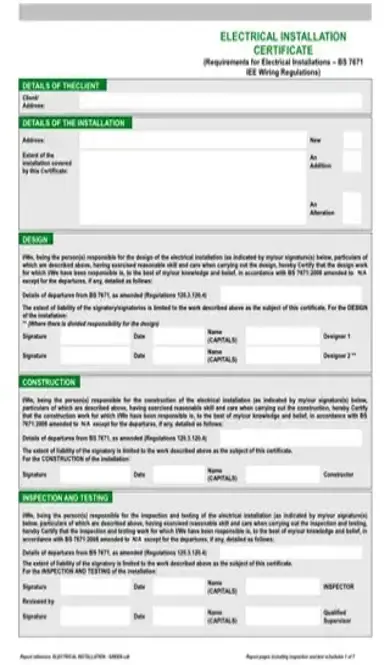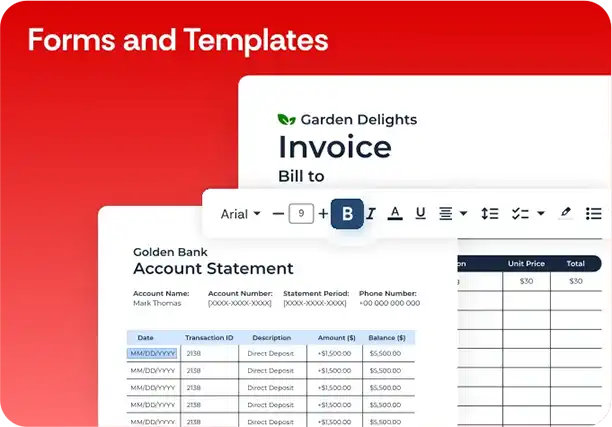Electrical Test Certificate PDF Template
Stop searching and find out why people love the ease of creating beautiful and legally compliant Electrical Test Certificate PDF with PDFSimpli.

Stop searching and find out why people love the ease of creating beautiful and legally compliant Electrical Test Certificate PDF with PDFSimpli.





[toc] All electrical installations, no matter how skillfully crafted, will begin to deteriorate as time passes. For this reason, electrical installations should receive testing and inspection over every 3 to 5 years. The test certificate will verify that an inspection was performed and that the installation is safe for continued use. It is basically an electrical safety certificate. This Electrical Certificate PDF can be edited by you or a professional and then certified by a professional when you conduct your electrical maintenance and/or inspection on the electrical systems in your home or building. Besides merely inspecting this form will detail any electrical work or electrical services done to the property and if they comply with the local IEE standards. You can use PDFSimpli’s amazing tool systems(similar to Acrobat Reader) to fill this certificate of compliance. PDFSimpli will permit you to change from PDF format to any other format and then print or email the test certificates.
The main part of an electrical test certificate is for the contractor to denote their findings. They’ll need to indicate whether they were testing electrical equipment for safety, or electrical installations for basic code compliance. They’ll also need to indicate the name of the person who hired them, along with the address of the property, the date of the test, and their contractor license number.
There are two main types of regular electrical tests: testing for electrical equipment and testing for electrical installations.
If tests were performed on any electrical installations that are part of a property, the certificate is used to affirm that the installation is safe and complies with any wiring rules and other code requirements set forth by the 2013 Electrical Safety Regulation legislation.
If tests were performed on electrical equipment, the certificate affirms that the parts of the equipment affected by electricity are safe to use. This is not an affirmation that the entirety of the equipment is safe, but every piece related to potential electrical hazards is safe.
The contractor or electrician who performs the electrical tests is the one responsible for filling out the certificate. This certificate is a form of their authorization. It’s used to indicate that a licensed professional has inspected the electric setups within an appropriate time period.
There are a number of reasons that a homeowner or property owner might request a test certificate from their electrician. It’s common for electrical testing to be done if a property is being rented or sold. Electrical inspection and testing are considered one of the many inspections that the current property owner is responsible for.
Whether the person set to occupy the space is buying or leasing, most rental and sales contracts require the landowner to take responsibility for inspections. Depending on the state you reside in, you might have a legal obligation to provide inspection certificates. If you haven’t had the property inspected in more than 5 years, you’ll need to hire an electrician or contractor to do the job. Otherwise, you won’t be able to verify that the property is safe for residency. In the case of electrical equipment, you won’t be able to verify that the equipment is safe to use.
Electrical inspections should occur on any property every 3 to 5 years. If you fail to have regular inspections, you won’t be certain whether your property is safe to live on. Some states might require regular inspections and issue a fine if you fail to have inspections done. This is doubly important when you rent a property to someone else.
When you sell a property, you’ll want to have an electrical inspection done as part of the overall home inspection process, even if your last inspection was less than 5 years ago.
An inspection certificate is a certification explaining that a licensed individual has tested the electric equipment or installations, and they found that the inspected property was safe for use. A contractor must be fully licensed and accredited before they have the authorization to issue a certificate of inspection.
The detailed electrical inspection report will be different from the certificate. The inspection report will explain exactly what property was tested, any hazards found, any damages, and any lack of adherence to legal codes. If the electrician finds any problem with the electrical installation or equipment, they will not be able to issue a test certificate until the problem has been repaired.
For landlords, there could be legal consequences to failing to have your property tested before a tenant moves in. You have a legal obligation to provide a safe dwelling for the tenant, which includes making sure all safety inspections are up-to-date. A lack of electrical inspection means that there’s no guarantee that the property’s electrical setup is safe. At worst, this could cause injury to either the landowner or the tenant. At best, it could cause the landowner to lose their right to the lease.
When you sell a home, the homeowner will be required to have a series of inspections and maintenance checks done. An electrical inspection is one of the main ones. If you’re missing a certificate of inspection, your buyer will notice. The sale may not go through until you’ve had all the necessary inspections completed and acquired all the required paperwork.
Finally, for non-leasing and non-selling property owners who fail to have their property inspected regularly, you risk not knowing when your electrical setup has become dangerous. All setups will erode over time. The danger level present when the wiring is first installed, and the danger level present twenty years later might be two very different things. To avoid property damage, injury, or even death, you should make sure a contractor is double-checking that your setup adheres to code. [pdf-embedder url=”https://cdn-prod-pdfsimpli-wpcontent.azureedge.net/pdfseoforms/pdf-20180219t134432z-001/pdf/electrical-test-certificate.pdf?sv=2018-03-28&si=readpolicy&sr=c&sig=MXHnWmn0sXNXztiU%2Bugk2d7DV7KBCOuXF3oBMx0EeEw%3D”]
The certificate will be filled by the contractor after they complete any routine testing and necessary repairs. They will write the name of the client for which they performed the work, along with the client’s address. They will then write a detailed description of any electrical equipment or installations that were tested.
The certificate will be dated with the date the test was completed. The contractor must write their license number, the name on their license, and the phone number by which they can be reached.
If you’re a landlord, yes. You need a certificate proving that your property is safe for the tenant. If you own and live on private property, then no.
Certifications don’t have an expiration date. However, a tenant-rented property should have a certification within the past five years, while owner-occupied properties should have certifications within the last ten years.
At this point, the electrician will need to assess the number of repairs necessary to make the setup adhere to safety codes. Until these repairs are completed and a successful inspection is done, they cannot issue a certificate.